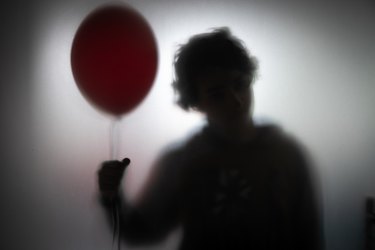
Horror movies sometimes have a reputation for being lame or cheesy. But there's good reason to watch if you're jonesing for one.
Turns out, fear-inducing situations that don't actually put you in danger — think: haunted houses, scary video games and, yep, horror movies — can come with some serious mental health perks.
Video of the Day
So grab your popcorn, turn out the lights and start streaming. You're about to reap some big benefits by getting freaked out.
The Benefits of Watching Horror Movies
It's natural to wonder if horror movies are bad for you, given the content. But the psychology behind watching scary movies goes much deeper than you might imagine.
Here's a look at a few of the reasons we like horror movies and the positive psychological effects they can have:
1. They Give You a Feel-Good Rush
Seeing a blood-curdling scenario on the screen floods your system with the hormone adrenaline, which activates your body's fight-or-flight response. The rush can make your heart race and your muscles tense, which can be pretty exhilarating for some, says Alissa Jerud, PhD, a licensed clinical psychologist and clinical assistant professor of psychology at the University of Pennsylvania in Philadelphia.
That's because you know even though you're scared, you're ultimately safe, suggests December 2020 research in Psychological Science.
Sure, the masked murderer might be breaking into every house on the block. But the panicky pit in your stomach is thrilling instead of terrifying because you know they're not actually going to break through your window.
The result? A nice little mood boost.
2. They Can Help You Cope With Fear
Watching terrifying or stressful scenarios play out on the screen might help you cope with similar situations in real life.
For instance, one January 2021 Personality and Individual Differences study found that fans of horror films showed signs of more resilience and preparedness during the COVID-19 pandemic compared to those who preferred alien invasion or zombie movies.
"When we're focused on something happening in our own lives that seems terrible and we see something in a horror movie, it might make the real thing more manageable," Jerud explains. "It can put things in perspective. Like, 'If they survived that horrific thing, I can do this.'"
And if you have a phobia or have experienced trauma, watching movies that feature the scary or traumatizing thing can actually be therapeutic.
"Exposure-based treatments for specific phobias and post-traumatic stress disorder sometimes involve intentionally watching those scenes that are really triggering. In doing so repeatedly, you learn that you can tolerate anxiety and respond differently when it shows up," Jerud says.
It's OK to try watching a scary or triggering movie or scene on your own, if you'd like. But if you are having panic attacks when doing so or if you find you're really struggling to watch on your own, you may want to seek professional support, Jerud recommends.
3. They Might Teach You Something About Yourself
For some, seeing something horrifying play out in a movie can give you empowering insight into your own personality.
If you're able to sit through something scary, you've learned you have the power to overcome your fears, suggests July 2021 findings in the Journal of Media Psychology.
In fact, even if you have to leave the room or turn the movie off when things get really tense, you've learned something about how you might handle a real-life situation that elicits similar emotions. And that self-knowledge can be a good thing, the study authors say.
Are There Negative Effects of Watching Scary Movies?
There's no evidence that watching monsters or slashers will have a negative long-term effect on mental health for most people.
But for some people, horror movies can definitely key up your anxiety in the short term. (What is that noise? Is someone at my door?!) And watching them before bed might give you nightmares or make it harder to fall sleep.
It's also possible that watching horror movies on the regular might desensitize you to upsetting situations in real life. In one May 2016 Journal of Youth and Adolescence study, people who frequently watch violence in movies or on TV experienced a rapid spike and drop in blood pressure when they were shown a violent video, which suggests they had lower emotional reactivity to violence.
Ultimately, it's up to you to decide whether a horror movie leaves you feeling good or not.
"You can notice, how is this movie impacting me right now? Is it impacting my behavior in a negative way?" Jerud says.
If you toss and turn every night after watching a horror movie or you're scared that someone might attack you when you're walking down the street, for instance, those are signs you may need to back off or switch to another genre.
The Bottom Line
Don't feel bad about streaming a horror movie next time the mood strikes. If you like the genre, you'll get a mood boost and maybe even get an opportunity to work through some deeper issues you might be dealing with.
On the other hand? If you're not a fan, feel free to pick a rom-com or a drama instead. There's no reason to force yourself to sit through a movie you don't like.
That said, if you're avoiding a certain movie because a scene triggers you, that could be a sign you have an unresolved trauma or phobia that needs to be addressed. In that case, consider talking with a therapist. Together, you can find ways to manage your fear or anxiety.
- Psychological Science: "Playing With Fear: A Field Study in Recreational Horror"
- Personality and Individual Differences: "Pandemic practice: Horror fans and morbidly curious individuals are more psychologically resilient during the COVID-19 pandemic"
- Journal of Media Psychology: "The psychological benefits of scary play in three types of horror fans."
- Journal of Youth and Adolescence: "Emotional and Physiological Desensitization to Real-Life and Movie Violence"
Is this an emergency? If you are experiencing serious medical symptoms, please see the National Library of Medicine’s list of signs you need emergency medical attention or call 911.


